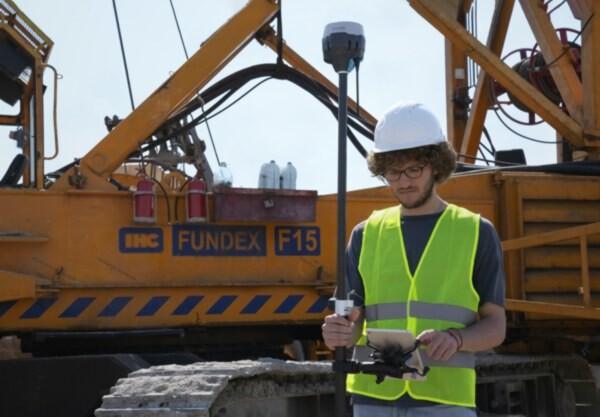Why is surveying in construction necessary?
 Construction sites are complex and require a range of processes to bring a project to life.
Construction sites are complex and require a range of processes to bring a project to life.
One of the most important of these processes is surveying. Surveying provides vital information for architects, engineers and construction teams to plan and execute a project safely, efficiently and to a high standard.
At Paragon Tool Hire, we have years of experience within the construction industry and know first-hand the importance of accurate surveying data. That’s why we are pleased to provide a wide range of site surveying equipment to help you stay ahead of your next project and ensure you have the tools you need to succeed.
Let us talk you through what surveying is in construction, exploring the benefits of accurate surveying data and how it impacts construction sites.
What is surveying in construction?
Surveying in construction involves the precise measurement and mapping of land areas to gather accurate information about their boundaries, topography and dimensions. This provides essential information for those working on a construction site as it helps them plan and execute their work safely. There are several types of surveying used within the construction industry, including building, topographical and land surveying.
Topographical surveying
Topographical surveying gathers data about the natural and man-made features of a piece of land. The purpose of a topographical survey is to create a detailed map of the land area and provide accurate details on its features and topography.
The map produced by the surveyor will include contour lines, which show changes in elevations, and annotations of any features such as buildings, trees and bodies of water.
Land surveying
Although similar to topographical surveying, land surveying focuses on determining the precise boundaries of a piece of land. Its main focus is the land’s dimensions and the information gathered is used by construction teams to design and plan projects that are suitable for the land area.
Building surveying
Building surveying is a detailed examination and evaluation of a building’s safety and structure. It can involve the measuring and mapping of its dimensions and features, such as walls, roofs and floors. The building surveyor will produce a detailed report, outlining their findings and recommendations for any issues that need rectifying. The report may include repairs, maintenance and a recommendation for demolition in some cases.
 Why is surveying in construction necessary?
Why is surveying in construction necessary?
Surveying in construction is vital for processes to run smoothly. By using the data produced from surveying, construction teams can plan and execute projects more efficiently and safely. Here’s how:
Accurate planning
Surveying allows the accurate planning and design of construction projects. It provides detailed and precise information about the land area which can help architects and engineers create accurate blueprints for the area.
Identifying obstacles
Surveying helps to identify any obstacles that may impact the construction project, such as uneven terrain. Identifying these issues early allows construction teams to develop strategies to overcome these challenges and complete work safely.
Cost-effective
By identifying any obstacles beforehand, construction teams will avoid unexpected delays and costly redesigns.
Compliance with regulations
Surveying can help construction projects to comply with various regulations, such as health and safety or environmental standards.
High-quality construction projects
The data produced from surveying can help to ensure the quality of construction projects by providing accurate information about the land area. This allows construction teams to plan and execute projects with enhanced attention to detail, providing high-quality results.
What is the surveying process?
Research and preparation: The surveyor will gather information about the land area, including its legal boundaries, history and any previous surveys.
Site surveying equipment selection: The site surveying equipment used can vary based on the size of the land and the complexity. This could include total stations and GPS equipment and other tools, such as measuring tapes and levels. To learn more about the site surveying equipment we provide at Paragon Tool Hire, please click here.
Fieldwork: The surveyor will then conduct the survey in the field, using a range of equipment and techniques to gather data about the land area.
Data processing: Once the fieldwork is complete, the surveyor will process the data collected. Measurements and survey notes will be produced into a detailed map or report.
Analysis: The surveyor will analyse the data and present the information in a clear and concise format, including maps, diagrams and reports.
How can Paragon help with surveying?
Here at Paragon Tool Hire, we are committed to helping our customers succeed. Our team are proud to provide professional site surveying equipment and expertise to support your project.
We offer essential tools like cable detectors, laser levels and other measuring equipment that will help your construction team carry out work safely and efficiently. Our friendly team can provide guidance on how to use the equipment and answer any questions you may have.
Our team of professionals has years of experience in the industry and can provide expert advice on the most suitable surveying equipment for hire. We take care of the maintenance of our site surveying equipment to ensure that it is always in excellent condition and ready to use when you need it.
We understand that surveying is a critical component of any construction project, and that is why we are committed to providing reliable site surveying equipment and exceptional service to ensure your project's success.
If you have any questions or would like to learn more about how we can help you with your surveying needs, please do not hesitate to get in touch with our friendly team. Give us a call today on 01280 822282. We will be happy to assist you.
